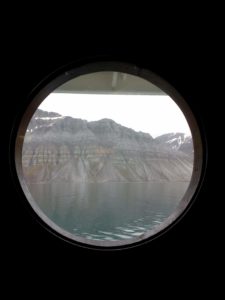Before arriving at the North Pole my main expectations about the PFTC4 were to expand my theoretical and analytical knowledge in functional plant ecology,and to experience the Arctic by conducting fieldwork activities. Those goals were indeed achieved along the course. Firstly, by attending interesting lectures, specially Aud’s talk about data management and Brian’s talk about the indices of functional diversity; Secondly, by using the Licor machine to obtain photosynthesis temperature curves and hence to understand how increasing air temperatures could affect plant performance. Although most of my time was spent in a container working with the Licor (and discussing whether O-rings could inflate or not), I had indeed the unique opportunity to experience the Arctic environment.
My impression about the Arctic was that it is a very beautiful, but also a very harsh place. As a tropical specimen, I learnt that I am definitely not suitable to this place with cold winds and 24 sunlight hours in the summertime! I got a cold in the very first day of the course and I had some sleeping problems too. Therefore, I was not surprised that only a few plant species can be found in this area. At a first glance, that tiny vegetation seemed monotonous and uninteresting, but a closer look revealed delicate flowers and leaves with very intriguing morphologies.
By surveying people in Svalbard to understand their perceptions about climate change, I realized that most people do not live in that place for long. Since it is not allowed neither to be born nor to die in Svalbard, people come to that island just to study or to work for a few years. Although they are not truly locals, most of them had observed the effects of global warming in this area, such
as a faster rate of glaciers melting and the occurrence of more avalanches. Thus, most of them accepted that planet is warming and that this is largely being caused by human activities. I believe that similar results would be found if this survey was conducted in Brazil, because many people in my country have been recently affected by climate change.
As Brazilians are usually very talk-active and expansive (I guess I am a Brazilian outlier), I also think that performing this survey in Brazil would be easier. My first attempt in Svalbard resulted in «I am not interested in talking about climate change. Not at all!». Fortunately, the following attempts were successful and at the end it was nice to see people sharing the pros and cons about living in the northernmost town of the world.

